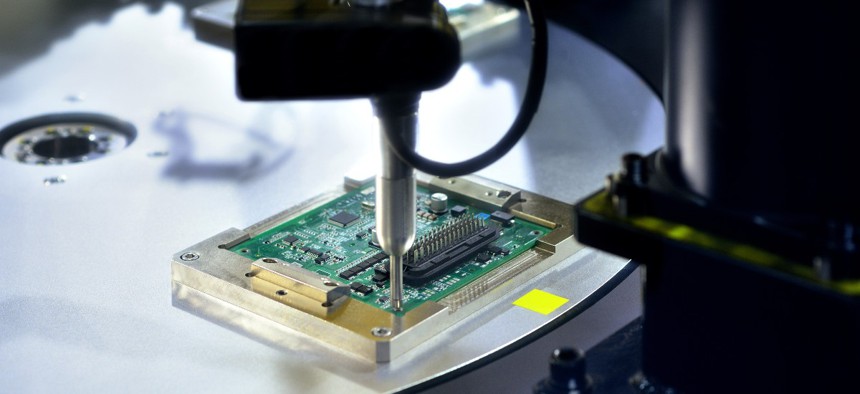NIST, Google announce chip R&D partnership

Comezora/Getty Images
The public-private sector collaboration will make industry standard chips available to smaller research entities to encourage semiconductor manufacturing.
The National Institute of Standards and Technology entered into a new agreement with search engine behemoth Google to help manufacture more chip technology that researchers can use as input ingredients for future nanotechnologies and semiconductors.
In a partnership with Minnesota-based SkyWater Technology, Google will fund the initial production costs for chip manufacturing, and NIST will design circuitry for chips alongside university affiliates.
The circuit designs will be available on open source platforms to democratize their proliferation across academic and commercial research.
“By creating a new and affordable domestic supply of chips for research and development, this collaboration aims to unleash the innovative potential of researchers and startups across the nation,” said Under Secretary of Commerce for Standards and Technology and NIST Director Laurie Locascio. “This is a great example of how government, industry and academic researchers can work together to enhance U.S. leadership in this critically important industry.”
Locascio added that this partnership was in the works before the passage of the landmark CHIPS and Science Act earlier this year. NIST’s motivation for facilitating the partnership was to lower overhead production costs for semiconductor manufacturers that supply university and startup researchers. Increasing production with private and public sector support eliminates the licensing fee requirements associated with procuring chips used in advanced technologies that utilize artificial intelligence and machine learning.
The NIST-Google partnership will specifically focus on making a bottom layer chip with structures designed to measure and test the performance of the chip’s future top layers, such as memory devices, nanosensors, bioelectronics and quantum computing devices.
SkyWater will then produce 200-millimeter discs of patterned silicon wafers to serve as chips for research entities to utilize at other facilities. This standard format is intended to be compatible with the majority of manufacturing robots at semiconductor factories.
Some of the academic partners included in this initiative and who will receive chips are the University of Michigan, the University of Maryland, George Washington University, Brown University and Carnegie Mellon University.
"Google has a long history of leadership in open-source,” said Will Grannis, the CEO of Google Public Sector. “Moving to an open-source framework fosters reproducibility, which helps researchers from public and private institutions iterate on each other’s work. It also democratizes innovation in nanotechnology and semiconductor research.”
The Biden Administration has made large strides over the past year in incentivizing domestic chip and semiconductor manufacturing, with President Joe Biden recently announcing a new biotechnology executive order to help U.S.-based manufacturing expand into different scientific markets.
NEXT STORY: Protests hit CACI's $5.7B Air Force win






